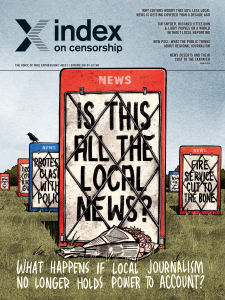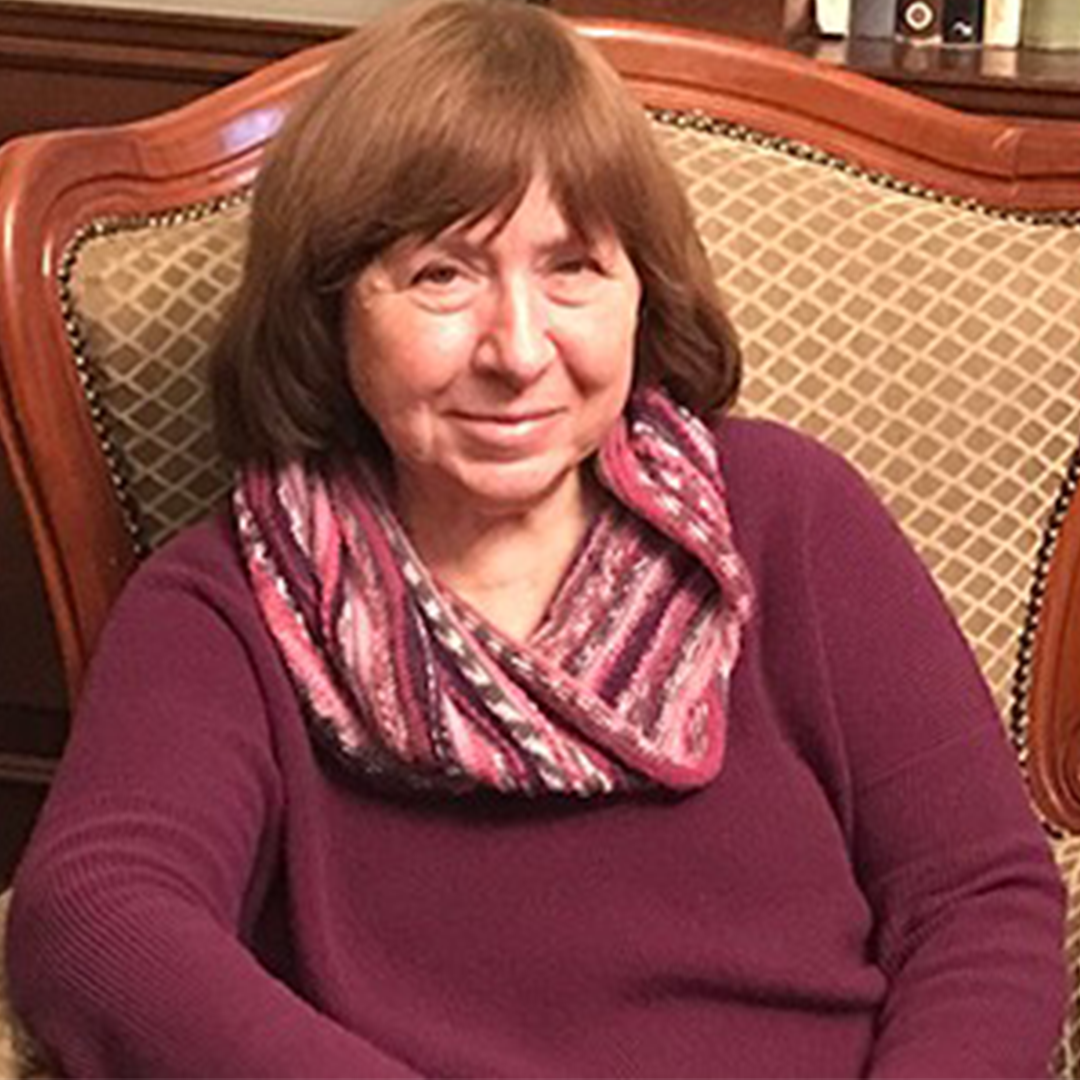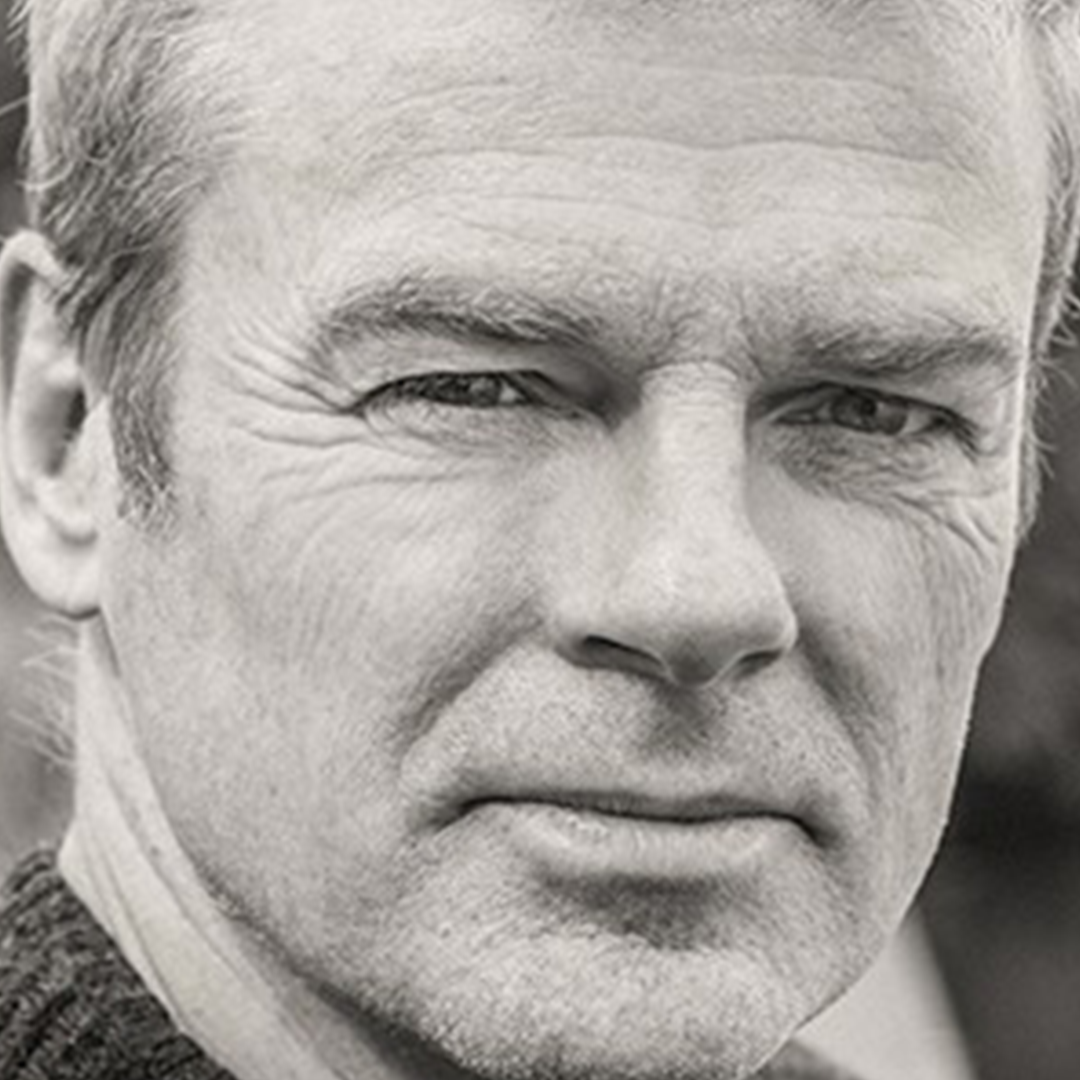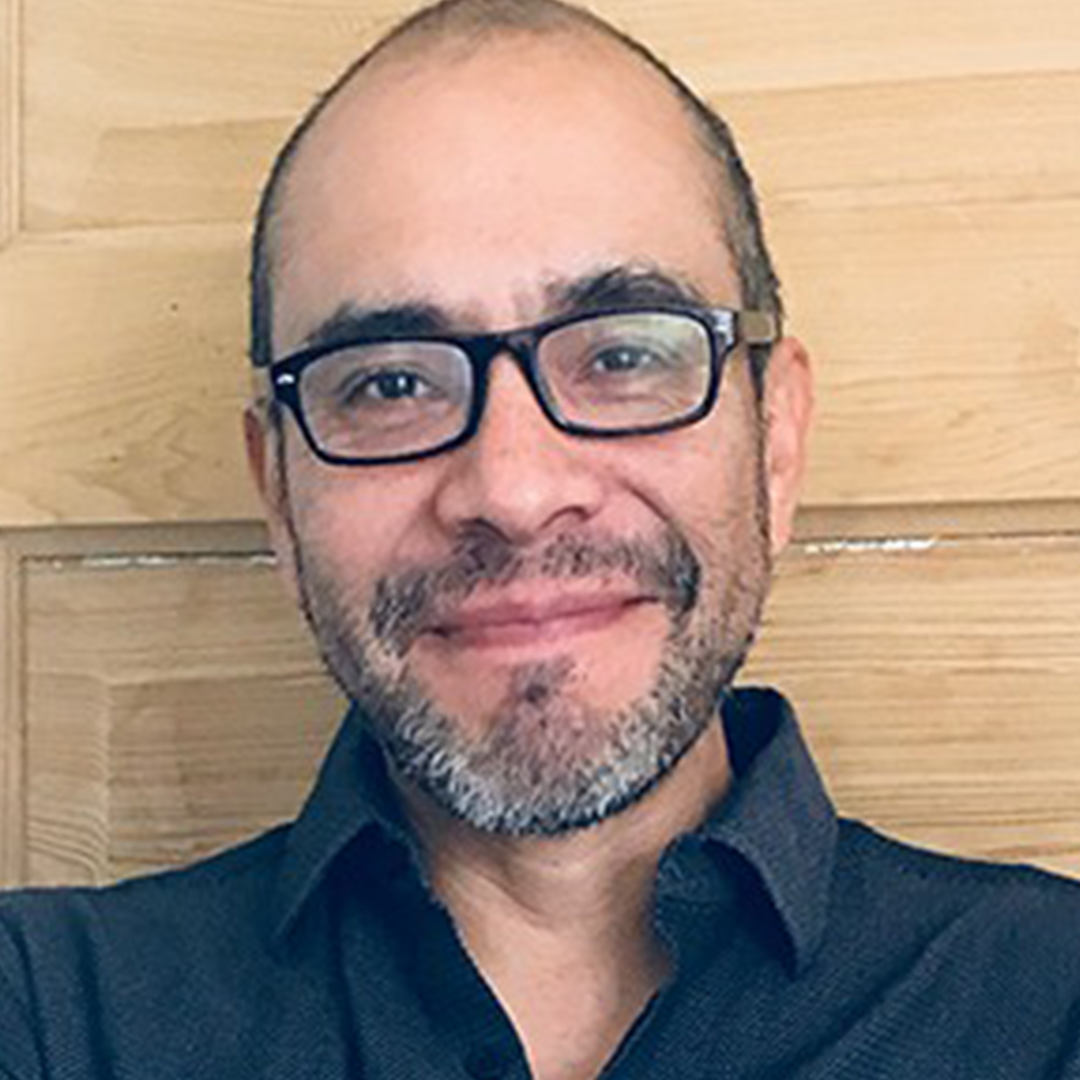26 Mar 19 | Magazine, Magazine Editions, Volume 48.01 Spring 2019
[vc_row][vc_column][vc_custom_heading text=”With contributions from Richard Littlejohn, Libby Purves, Michal Hvorecký, Karoline Kan, Andrew Morton, Jeffrey Wasserstrom, Rituparna Chatterjee and Julie Posetti”][/vc_column][/vc_row][vc_row][vc_column][vc_column_text]

Is this all the local news? The spring 2019 issue of Index on Censorship magazine.
The spring 2019 edition of Index on Censorship looks at local news in the UK and around the world and what happens when local journalism no longer holds power to account.
Our exclusive survey of editors and journalists in the UK shows that 97% are worried that local newspapers don’t have the resources any more to hold power to account. Meanwhile the older population tell us they are worried that the public is less well informed than it used to be. Local news reporting is in trouble all over the world. In the USA Jan Fox looks at the news deserts phenomenon and what it means for a local area to lose its newspaper. Karoline Kan writes from China about how local newspapers, which used to have the freedom to cover crises and hold the government to account, are closing as they come increasingly under Communist Party scrutiny. Veteran English radio journalist Libby Purves tells editor Rachael Jolley that local newspapers in the UK used to give a voice to working-class people and that their demise may have contributed to Brexit. In India Rituparna Chatterjee finds a huge appetite for local news, but discovers, with some notable exceptions, that there is not enough investment to satisfy demand. “Fake news” is on the rise, and journalists are vulnerable to bribery. Meanwhile Mark Frary examines how artificial intelligence is being used to write news stories and asks whether this is helping or hindering journalism. Finally an extract from the dystopian Slovak novel Troll, Michal Hvorecký published in English for the first time imagines an outpouring of state-sponsored hate
[/vc_column_text][/vc_column][/vc_row][vc_row][vc_column][vc_custom_heading text=”Special Report: Is this all the local news?”][/vc_column][/vc_row][vc_row][vc_column][vc_column_text]
The future is robotic by Mark Frary Would journalists have more time to investigate news stories if robots did the easy bits?
Terrorising the truth by Stephen Woodman Journalists on the US border are too intimidated by drug cartels to report what is happening
Switched off by Irene Caselli After years as a political football, Argentinian papers are closing as people turn to the internet for news
News loses by Jan Fox Thousands of US communities have lost their daily papers. What is the cost to their area?
Stripsearch by Martin Rowson On the death of local news
What happens when our local news disappears by Tracey Bagshaw How UK local newspapers are closing and coverage of court proceedings is not happening
Who will do the difficult stories now? by Rachael Jolley British local newspaper editors fear a future where powerful figures are not held to account, plus a poll of public opinion on journalism
“People feel too small to be heard” by Rachael Jolley Columnist Libby Purves tells Index fewer working-class voices are being heard and wonders whether this contributed to Brexit
Fighting for funding by Peter Sands UK newspaper editors talk about the pressures on local newspapers in Britain today
Staying alive by Laura Silvia Battaglia Reporter Sandro Ruotolo reveals how local news reporters in southern Italy are threatened by the Mafia
Dearth of news by Karoline Kan Some local newspapers in China no longer dig into corruption or give a voice to local people as Communist Party scrutiny increases
Remote controller by Dan Nolan What happens when all major media, state and private, is controlled by Hungary’s government and all the front pages start looking the same
Rocky times by Monica O’Shea Local Australian newspapers are merging, closing and losing circulation which leaves scandals unreported
[/vc_column_text][/vc_column][/vc_row][vc_row][vc_column][vc_custom_heading text=”Global View”][vc_column_text]
[/vc_column_text][/vc_column][/vc_row][vc_row][vc_column][vc_custom_heading text=”In Focus”][vc_column_text]
Turning off the searchlights by Alessio Perrone The Italian government attempts to restrict coverage of the plight of refugees crossing the Mediterranean
Standing up for freedom Adam Reichardt A look at Gdańsk’s history of protest and liberalism, as the city fights back after the murder of mayor Paweł Adamowicz
After the purge by Samuel Abrahám and Miriam Sherwood This feature asks two writers about lessons for today from their Slovak families’ experiences 50 years ago
Fakebusters strike back by Raymond Joseph How to spot deep fakes, the manipulated videos that are the newest form of “fake news” to hit the internet
Cover up by Charlotte Bailey Kuwaiti writer Layla AlAmmar discusses why 4,000 books were banned in her home country and the possible fate of her first #MeToo novel
Silence speaks volumes by Neema Komba Tanzanian artists and musicians are facing government censorship in a country where 64 new restrictions have just been introduced
[/vc_column_text][/vc_column][/vc_row][vc_row][vc_column][vc_custom_heading text=”Culture”][vc_column_text]
The year of the troll by Michal Hvorecký This extract from the novel Troll describes a world where the government controls the people by spewing out hate 24 hours a day
Ghost writers by Jeffrey Wasserstrom The author and China expert imagines a fictional futuristic lecture he’s going to give in 2049, the centenary of Orwell’s Nineteen Eighty-Four
Protesting through poetry by Radu Vancu Verses by one of Romania’s most renowned poets draw on his experience of anti-corruption protests in Sibiu
[/vc_column_text][/vc_column][/vc_row][vc_row][vc_column][vc_custom_heading text=”Column”][vc_column_text]
[/vc_column_text][/vc_column][/vc_row][vc_row][vc_column][vc_custom_heading text=”Endnote”][vc_column_text]
Press freedom: EU blind spot? By Sally Gimson Many European countries are violating freedom of the press; why is the EU not taking it more seriously?
[/vc_column_text][/vc_column][/vc_row][vc_row][vc_column width=”1/3″][vc_custom_heading text=”Subscribe”][vc_column_text]In print, online, in your mailbox, on your iPad.
Subscription options from £18 or just £1.49 in the App Store for a digital issue.
Every subscriber helps support Index on Censorship’s projects around the world.
 SUBSCRIBE NOW[/vc_column_text][/vc_column][vc_column width=”1/3″][vc_single_image image=”105481″ img_size=”medium”][/vc_column][vc_column width=”1/3″][vc_custom_heading text=”Listen”][vc_column_text]The spring 2019 magazine podcast, featuring interviews with editor of chinadialogue, Karoline Kan; director of the Society of Editors in the UK Ian Murray and co-founder of the Bishop’s Stortford Independent, Sinead Corr. Index youth board members Arpitha Desai and Melissa Zisingwe also talk about local journalism in India and Zimbabwe
SUBSCRIBE NOW[/vc_column_text][/vc_column][vc_column width=”1/3″][vc_single_image image=”105481″ img_size=”medium”][/vc_column][vc_column width=”1/3″][vc_custom_heading text=”Listen”][vc_column_text]The spring 2019 magazine podcast, featuring interviews with editor of chinadialogue, Karoline Kan; director of the Society of Editors in the UK Ian Murray and co-founder of the Bishop’s Stortford Independent, Sinead Corr. Index youth board members Arpitha Desai and Melissa Zisingwe also talk about local journalism in India and Zimbabwe
LISTEN HERE[/vc_column_text][/vc_column][/vc_row]
25 Jan 19 | Magazine, News and features, Volume 47.04 Winter 2018 Extras
[vc_row][vc_column][vc_single_image image=”104228″ img_size=”full” add_caption=”yes”][vc_column_text]
Rachael Jolley, editor of Index on Censorship magazine, Sally Gimson, deputy editor, and Tracey Bagshaw, journalist and magazine contributor — with special help from editorial assistant Lewis Jennings — were live on air at Resonance FM on 21 January to discuss the latest issue which takes a special look at why different societies stop people discussing the most significant events in life.
In China, as Karoline Kan reports, women were forced for many years to have just one child and now they are being pushed to have two, but it is not something to talk about. In South Korea Steven Borowiec finds men have taken to social media to condemn a new film adaptation of a novel about motherhood. Irene Caselli describes the consequences in Latin America of preventing discussion about contraception and sexually transmitted infections. Joan McFadden digs into attitudes to gay marriage in the Hebrides, where she grew up, and interviews the Presbyterian minister who demonstrated against Lewis Pride. We have an original play from Syrian dramatist Liwaa Yazji about fear and violent death. While flash fiction writer Neema Komba imagines a Tanzanian bride challenging the marriage committee over her wedding cake. Finally, Nobel-prize-winning author Svetlana Alexievich tells us that she is sanguine about the mortal dangers of chronicling and criticising post-Soviet Russia.
Print copies of the magazine are available on Amazon, or you can take out a digital subscription via Exact Editions. Copies are also available at the BFI, the Serpetine Gallery and MagCulture (all London), News from Nowhere (Liverpool). Red Lion Books (Colchester) and Home (Manchester). Each magazine sale helps Index on Censorship continue its fight for free expression worldwide.
The Winter 2018 podcast can also be found on iTunes.[/vc_column_text][vc_basic_grid post_type=”post” max_items=”4″ element_width=”6″ grid_id=”vc_gid:1548431570319-1f2dca2e-e6db-5″ taxonomies=”30752″][/vc_column][/vc_row]
13 Dec 18 | Magazine, Magazine Editions, Volume 47.04 Winter 2018
Author
Svetlana Alexievich won the Nobel Prize for Literature in 2015. The Belarusian author is celebrated for her writing about the post-Soviet world. In her books The Unwomanly Face of War, Boys in Zinc and Secondhand Time she chronicles the experience of ordinary people
Novelist
Mark Haddon is an author, illustrator and screenwriter who has written fifteen books for children and won two BAFTAs. His bestselling novel, The Curious Incident of the Dog in the Night-time, won seventeen literary prizes
Novelist
Yuri Herrera is a bestselling Mexican writer currently based in the USA. His first novel Trabajos del reino won the 2003 Binacional de Novela/Border of Words and made Herrera one of the most famous writers in Latin America
13 Dec 18 | Magazine, Magazine Contents, Volume 47.04 Winter 2018
[vc_row][vc_column][vc_custom_heading text=”With contributions from Liwaa Yazji, Karoline Kan, Jieun Baek, Neema Komba, Bhekisisa Mncube, Yuri Herrera, Peter Carey, Mark Haddon”][/vc_column][/vc_row][vc_row][vc_column][vc_column_text]
The winter 2018 issue of Index on Censorship magazine looks at why different societies stop people discussing the most significant events in life: birth, marriage and death.
In China, as Karoline Kan reports, women were forced for many years to have only one child and now they are being pushed to have two, but many don’t feel like they can talk about why they may not want to make that choice. In North Korea Jieun Baek talks to defectors about the ignorance of young men and women in a country where your body essentially belongs to the state. Meanwhile Irene Caselli describes the consequences for women in Latin America who are not taught about sex, contraception or sexually transmitted infections, and the battle between women campaigners and the forces of ultra conservatism. In the USA, Jan Fox finds Asian American women have always faced problems because sex is not talked about properly in their community. President Trump’s new “gag” law which stops women getting advice about abortion is set to make that much worse. In the far north of Scotland, controversy is raging about gay marriage. Joan McFadden finds out about attitudes to gay marriage on the Isle of Lewis in Scotland, and catches up with the Presbyterian minister who demonstrated against the first Lewis Pride. In Ghana Lewis Jennings finds there are no inhibitions when it comes to funerals. Brightly coloured coffins shaped like coke bottles and animals are all rage.
[/vc_column_text][/vc_column][/vc_row][vc_row][vc_column][vc_single_image image=”104226″ img_size=”full”][/vc_column][/vc_row][vc_row][vc_column][/vc_column][/vc_row][vc_row][vc_column][vc_custom_heading text=”Special Report: Birth, Marriage and Death”][/vc_column][/vc_row][vc_row][vc_column][vc_column_text]
Labour pains by Daria Litvinova: Mothers speak out about the abuse they receive while giving birth in Russian hospitals
When two is too many by Karoline Kan: Chinese women are being encouraged to have two babies now and many are afraid to talk about why they don’t want to
Chatting about death over tea by Tracey Bagshaw: The British are getting more relaxed about talking about dying, and Stephen Woodman reports on Mexico’s Day of the Dead being used for protest
Stripsearch by Martin Rowson: Taboos in the boozer. Death finds a gloomy bunch of stiffs in an English pub…
“Don’t talk about sex” by Irene Caselli: Women and girls in Latin America are being told that toothpaste can be used as a contraceptive and other lies about sex
Death goes unchallenged by Wendy Funes: Thousands of people are murdered in Honduras every year and no one is talking about it – a special investigation by Index’s 2018 journalism fellow
Reproducing silence by Jan Fox: Asian-American communities in the USA don’t discuss sex, and planned US laws will make talking about abortion and contraception more difficult
A matter of strife and death by Kaya Genç: Funeral processions in Turkey have become political gatherings where “martyrs” are celebrated and mass protests take place. Why?
Rest in peace and art by Lewis Jenning: Ghanaians are putting the fun into funerals by getting buried in artsy coffins shaped like animals and even Coke bottles
When your body belongs to the state by Jieun Baek: Girls in North Korea are told that a man’s touch can get them pregnant while those who ask about sex are considered a moral and political threat to society
Maternal film sparks row by Steven Borowiec: South Korean men are getting very angry indeed about the planned film adaption of a novel about motherhood
Taking Pride in change by Joan McFadden: Attitudes to gay marriage in Scotland’s remote islands are changing slowly, but the strict Presbyterian churches came out to demonstrate against the first Pride march in the Hebrides
Silence about C-sections by Wana Udobang: Nigeria has some of the highest infant and maternal mortality rates in the world, in part, because of taboos over Caesarean sections
We need to talk about genocide by Abigail Frymann Rouch: Rwanda, Cambodia and Germany have all dealt with past genocides differently, but the healthiest nations are those which discuss it openly
Opposites attract…trouble by Bhekisisa Mncube: Seventy years after interracial marriages were prohibited in South Africa, the author writes about what happened when he married a white woman
[/vc_column_text][/vc_column][/vc_row][vc_row][vc_column][vc_custom_heading text=”Global View”][vc_column_text]
Snowflakes and diamonds by Jodie Ginsberg: Under-18s are happy to stand up for free speech and talk to those with whom they disagree
[/vc_column_text][/vc_column][/vc_row][vc_row][vc_column][vc_custom_heading text=”In Focus”][vc_column_text]
Killing the news by Ryan McChristal: Photographer Paul Conroy, who worked with Sunday Times correspondent Marie Colvin, says editors struggle to cover war zones now
An undelivered love letter by Jemimah Steinfeld: Kite Runner star Khalid Abdalla talks about how his film In the Last Days of the City can’t be screened in the city where it is set, Cairo
Character (f)laws by Alison Flood: Francine Prose, Melvin Burgess, Peter Carey and Mark Haddon reflect on whether they could publish their acclaimed books today
Truth or dare by Sally Gimson: An interview with Nobel prize-winning author Svetlana Alexievich about her work and how she copes with threats against her
From armed rebellion to radical radio by Stephen Woodman: Nearly 25 years after they seized power in Chiapas, Mexico, Zapatistas are running village schools and radio stations, and even putting people up for election
[/vc_column_text][/vc_column][/vc_row][vc_row][vc_column][vc_custom_heading text=”Culture”][vc_column_text]
Dangerous Choices by Liwaa Yazji: The Syrian writer’s new play about the horror of a mother waiting at home to be killed and then taking matters into her own hands, published for the first time
Sweat the small stuff by Neema Komba: Cakes, marriage and how one bride breaks with tradition, a new short story by a young Tanzanian flash fiction writer
Power play by Yuri Herrera: This short story by one of Mexico’s most famous contemporary authors is about the irrational exercise of power which shuts down others. Translated into English for the first time
[/vc_column_text][/vc_column][/vc_row][vc_row][vc_column][vc_custom_heading text=”Column”][vc_column_text]
Index around the world – Artists fight against censors by Lewis Jennings: Index has run a workshop on censorship of Noël Coward plays and battled the British government to give visas to our Cuban Index fellows 2018 (it took seven months)
[/vc_column_text][/vc_column][/vc_row][vc_row][vc_column][vc_custom_heading text=”Endnote”][vc_column_text]
The new “civil service” trolls who aim to distract by Jemimah Steinfeld: The government in China are using their civil servants to act as internet trolls. It’s a hard management task generating 450 million social media posts a year
[/vc_column_text][/vc_column][/vc_row][vc_row][vc_column width=”1/3″][vc_custom_heading text=”Subscribe”][vc_column_text]In print, online. In your mailbox, on your iPad.
Subscription options from £18 or just £1.49 in the App Store for a digital issue.
Every subscriber helps support Index on Censorship’s projects around the world.
 SUBSCRIBE NOW[/vc_column_text][/vc_column][vc_column width=”1/3″][vc_single_image image=”104225″ img_size=”medium”][/vc_column][vc_column width=”1/3″][vc_custom_heading text=”Listen”][vc_column_text]The winter 2018 magazine podcast, featuring interviews with Times columnist Edward Lucas, Argentina-based journalist Irene Caselli, writer Jieun Baek and law lecturer Sharon Thompson
SUBSCRIBE NOW[/vc_column_text][/vc_column][vc_column width=”1/3″][vc_single_image image=”104225″ img_size=”medium”][/vc_column][vc_column width=”1/3″][vc_custom_heading text=”Listen”][vc_column_text]The winter 2018 magazine podcast, featuring interviews with Times columnist Edward Lucas, Argentina-based journalist Irene Caselli, writer Jieun Baek and law lecturer Sharon Thompson
LISTEN HERE[/vc_column_text][/vc_column][/vc_row]

![]() SUBSCRIBE NOW[/vc_column_text][/vc_column][vc_column width=”1/3″][vc_single_image image=”105481″ img_size=”medium”][/vc_column][vc_column width=”1/3″][vc_custom_heading text=”Listen”][vc_column_text]The spring 2019 magazine podcast, featuring interviews with editor of chinadialogue, Karoline Kan; director of the Society of Editors in the UK Ian Murray and co-founder of the Bishop’s Stortford Independent, Sinead Corr. Index youth board members Arpitha Desai and Melissa Zisingwe also talk about local journalism in India and Zimbabwe
SUBSCRIBE NOW[/vc_column_text][/vc_column][vc_column width=”1/3″][vc_single_image image=”105481″ img_size=”medium”][/vc_column][vc_column width=”1/3″][vc_custom_heading text=”Listen”][vc_column_text]The spring 2019 magazine podcast, featuring interviews with editor of chinadialogue, Karoline Kan; director of the Society of Editors in the UK Ian Murray and co-founder of the Bishop’s Stortford Independent, Sinead Corr. Index youth board members Arpitha Desai and Melissa Zisingwe also talk about local journalism in India and Zimbabwe


![]() SUBSCRIBE NOW[/vc_column_text][/vc_column][vc_column width=”1/3″][vc_single_image image=”104225″ img_size=”medium”][/vc_column][vc_column width=”1/3″][vc_custom_heading text=”Listen”][vc_column_text]The winter 2018 magazine podcast, featuring interviews with Times columnist Edward Lucas, Argentina-based journalist Irene Caselli, writer Jieun Baek and law lecturer Sharon Thompson
SUBSCRIBE NOW[/vc_column_text][/vc_column][vc_column width=”1/3″][vc_single_image image=”104225″ img_size=”medium”][/vc_column][vc_column width=”1/3″][vc_custom_heading text=”Listen”][vc_column_text]The winter 2018 magazine podcast, featuring interviews with Times columnist Edward Lucas, Argentina-based journalist Irene Caselli, writer Jieun Baek and law lecturer Sharon Thompson